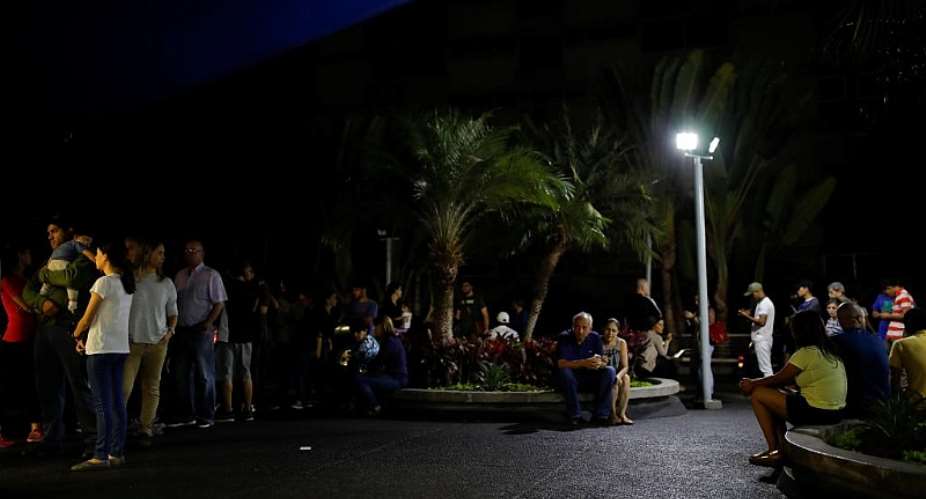Supporters of Venezuela's President, Nicolás Maduro, and US-backed opposition leader, Juan Guaidó, returned to the streets again on Saturday amid power cuts and rising fears that the political crisis could be entering a volatile new phase.
Nearly all of Venezuela's 23 states were plunged into darkness on Thursday afternoon after the most severe power cut in the country's recent history.
The blackout continued all through Friday and into Saturday, as thousands of protesters turned out to support their respective leaders, who have been locked in a power struggle for the last two months since Juan Guaidó, who leads the opposition-controlled National Assembly, declared himself interim president on January 23rd.
Guaidó has been recognised as interim president by more than 50 countries, including the United States and most of Europe.
Russia, China, Turkey, Mexico, Bolivia and a number of other countries have reaffirmed their support for Maduro as Venezuela's only legitimate president.
Blackout and Maduro
The blackout promptly became a point of dispute between President Maduro and the US-backed opposition trying to oust him.
Friday evening, Venezuela's defence minister accused the US of masterminding the power cut.
In a televised address from the Miraflores presidential palace in Caracas, Vladimir Padrino López claimed the US was behind a “criminal aggression” designed to “disrupt and attack” Maduro's administration.
Maduro has also accused the opposition of sabotage while his vice president, Delcy Rodriguez, condemned what she called an "imperial electrical war".
Guaido responds to darkness
In response, Guaidó urged Venezuelans to demonstrate on Saturday "against the usurping, corrupt and incompetent regime that has put our country in the dark".
The self-declared interim president and the opposition blame the massive power cut on poor maintenance, under-investment and corruption.
Washington denies having a role in the electricity system collapse.
Outage directly affecting Venezuelans
The nationwide power outage has reportedly been caused by problems at the Guri hydroelectric plant in the southern Bolivar state - one of the largest such facilities in Latin America.
The Guri hydroelectric plant supplies much of the country's electricity.
On Friday, offices and school were closed to help efforts to restore electricity. Hospitals have also been affected as some medical facilities do not have emergency power generators.
Dr. Julio Castro, one of the leaders of the non-profit Doctors for Health, reported via a tweet that about half of 23 hospitals surveyed were grappling with failing generators.
In Caracas's University Hospital, 25-year-old patient Marielsi Aray died after her respirator stopped working.
Video footage posted on social media showed doctors trying to keep children breathing at
the capital's Supreme Commander Hugo Chávez paediatric hospital after it lost power.
At a maternity ward in the capital Caracas an Associated Press reporter saw nurses use candles to monitor the vital signs of their premature babies as power failed.
On Saturday morning power supplies in Caracas appeared to be partially restored.
Traffic lights in some areas were back in action but the city's metro remained closed.
According to El Nacional newspaper, fourteen of Venezuela's 23 states are still affected by the outages.
The blackout has sparked fears of the human cost of the power cuts and that it could further destabilize the beleaguered country, sending it into a new turbulent period.





 We’ll no longer tolerate your empty, unwarranted attacks – TUC blasts Prof Adei
We’ll no longer tolerate your empty, unwarranted attacks – TUC blasts Prof Adei
 Bawumia donates GHc200,000 to support Madina fire victims
Bawumia donates GHc200,000 to support Madina fire victims
 IMF to disburse US$360million third tranche to Ghana without creditors MoU
IMF to disburse US$360million third tranche to Ghana without creditors MoU
 Truck owner share insights into train collision incident
Truck owner share insights into train collision incident
 Paramount chief of Bassare Traditional Area passes on
Paramount chief of Bassare Traditional Area passes on
 Two teachers in court over alleged illegal possession of BECE papers
Two teachers in court over alleged illegal possession of BECE papers
 Sunyani: Victim allegedly shot by traditional warriors appeals for justice
Sunyani: Victim allegedly shot by traditional warriors appeals for justice
 Mahama vows to scrap teacher licensure exams, review Free SHS policy
Mahama vows to scrap teacher licensure exams, review Free SHS policy
 Government will replace burnt Madina shops with a new three-story, 120-store fac...
Government will replace burnt Madina shops with a new three-story, 120-store fac...
